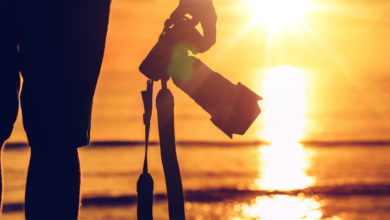Exploring the Best DSLR Cameras for Beginners

Capture the world in stunning detail and unleash your creativity with a DSLR camera! If you’re just starting on your photography journey, you’ve come to the right place. In this blog post, we’ll dive into the exciting world of DSLR cameras for beginners, helping you find the perfect tool to ignite your passion for capturing breathtaking moments. Whether you’re interested in landscape photography, or portraitures, or simply want to take better photos of everyday life, we’ve got you covered. Get ready to explore the best DSLR cameras for beginners and unlock endless possibilities behind the lens!
What is a DSLR Camera?
What is a DSLR camera, you ask? Well, let’s unravel the mystery behind this powerful photographic tool. DSLR stands for Digital Single-Lens Reflex, combining advanced digital technology with the versatility of interchangeable lenses. Unlike point-and-shoot cameras or smartphones, DSLRs offer superior image quality and control over settings.
One key feature of a DSLR camera is its mirror mechanism. Light enters through the lens and reflects off a mirror onto a prism that then redirects it to the viewfinder. This allows you to see exactly what your lens sees in real-time – no guesswork involved!
Another advantage of DSLRs lies in their large image sensors. These sensors capture more light, resulting in sharper images with better dynamic range and low-light performance compared to compact cameras or smartphones.
But it doesn’t end there! DSLRs allow you to experiment with different lenses for various shooting scenarios. From wide-angle lenses for expansive landscapes to telephoto lenses for capturing distant subjects up close, the possibilities are endless.
Moreover, manual controls on a DSLR give you full creative freedom to adjust settings like aperture (f-stop), shutter speed, and ISO sensitivity according to your desired effect or lighting conditions.
In essence, a DSLR camera empowers beginners by offering them professional-grade features without overwhelming complexity. So if you’re ready to take your photography skills up several notches and explore new horizons of artistic expression through stunning visuals – get yourself a trusty DSLR!

Benefits of Using a DSLR Camera for Beginners
When it comes to photography, there is no denying the power and versatility of a DSLR camera. For beginners especially, investing in a DSLR can bring about numerous benefits that will enhance their photographic journey.
One major advantage of using a DSLR camera as a beginner is its image quality. With larger sensors and the ability to use interchangeable lenses, DSLRs capture stunning images with vibrant colors and sharp details. This allows beginners to produce professional-looking photos right from the start.
Another benefit is the control that DSLRs offer over settings such as aperture, shutter speed, and ISO. These manual controls allow beginners to experiment with different techniques and create unique effects in their photographs. It also helps them understand how these settings work together to achieve desired results.
Additionally, DSLRs provide better performance in low-light conditions compared to compact cameras or smartphones. The larger sensor size enables them to capture more light, resulting in less noise and clearer images even in dimly lit environments.
Furthermore, using a DSLR camera encourages learning and growth as photographers progress on their creative journey. As beginners become familiar with the functionalities of their cameras, they gain confidence in exploring various genres like landscape photography or portrait photography.
Last but not least important are the opportunities for expansion and personalization offered by DSLRs. With access to an extensive range of lenses and accessories available on the market today, beginners can tailor their equipment according to their specific interests or needs.
In conclusion (as per instruction), investing in a DSLR camera provides numerous benefits for beginners who want to delve into photography more seriously. From superior image quality and manual controls for customization to improved performance in challenging lighting situations – acquiring a good entry-level DLSR will undoubtedly unlock new possibilities for aspiring photographers!
Top Features to Consider When Choosing a DSLR Camera
When it comes to choosing a DSLR camera for beginners, there are several key features that you should consider. These features will not only enhance your photography experience but also help you grow as a photographer.
First and foremost, pay attention to the image sensor size. A larger sensor can capture more light, resulting in better image quality and low-light performance. Look for cameras with APS-C or full-frame sensors for optimal results.
Next, consider the megapixel count. While higher megapixels can lead to sharper images, don’t get too caught up in this number alone. It’s more important to have a well-balanced camera with good ISO capabilities and dynamic range.
Another crucial feature is the autofocus (AF) system. Look for cameras that offer fast and accurate AF performance, especially if you plan on capturing moving subjects or shooting in challenging conditions.
In addition, having an articulating LCD screen can greatly improve your shooting flexibility by allowing you to take photos from various angles without straining your neck or back.
Other features worth considering include a burst shooting rate (for capturing action shots), video recording capabilities (if you’re interested in videography), built-in Wi-Fi connectivity (for easy sharing of photos online), and available lens options compatible with the camera system.
Remember to carefully evaluate these features based on your personal preferences and intended use of the camera before making a purchase decision!
Comparison of Popular DSLR Cameras for Beginners (Nikon, Canon, Sony)
When it comes to choosing a DSLR camera for beginners, three brands stand out: Nikon, Canon, and Sony. Each brand has its strengths and features that cater to different types of photographers.
Nikon offers a wide range of entry-level DSLRs that are perfect for beginners. The Nikon D3500 is one such option, known for its user-friendly interface and excellent image quality. It also has built-in guides that help new photographers understand the various settings and techniques.
Canon, on the other hand, is renowned for its intuitive controls and reliable performance. The Canon EOS Rebel T7i is a popular choice among beginners due to its advanced autofocus system and high-resolution sensor. It also offers Wi-Fi connectivity, making it easier to transfer photos wirelessly.
Sony stands out with its mirrorless cameras that combine compactness with powerful performance. The Sony Alpha A6000 is highly recommended for beginners as it offers fast autofocus, impressive image quality, and a tilting screen for easy composition.
The best DSLR camera for beginners depends on personal preferences and shooting style. It’s advisable to try out different models in person or read detailed reviews before making a decision.
Budget-Friendly Options for Beginner Photographers
When it comes to photography, beginners often find themselves on a tight budget. Fortunately, there are plenty of budget-friendly DSLR cameras available that can still deliver impressive results. Here are some options to consider:
1. Nikon D3500: This entry-level camera offers excellent image quality and user-friendly controls at an affordable price point. It features a 24-megapixel sensor, a fast autofocus system, and a beginner-friendly Guide Mode.
2. Canon EOS Rebel T7: Another great option for beginners is the Canon EOS Rebel T7. With its 24-megapixel sensor and built-in Wi-Fi capabilities, it allows you to easily share your photos with friends and family.
3. Sony Alpha a6000: The Sony Alpha a6000 is known for its compact size and advanced autofocus system. With its 24-megapixel sensor and continuous shooting speed of up to 11 frames per second, it’s perfect for capturing fast-moving subjects.
4. Olympus OM-D E-M10 Mark III: If you’re looking for a mirrorless option, the Olympus OM-D E-M10 Mark III is worth considering. It has a smaller form factor but still packs powerful features such as in-body image stabilization and 4K video recording.
Remember, while these cameras may be more affordable than high-end models, they still offer great image quality and functionality that will help you develop your photography skills without breaking the bank!
Tips for Using a DSLR Camera as a Beginner
Getting started with a DSLR camera can be both exciting and overwhelming. To help you navigate through the learning curve, here are some essential tips to keep in mind.
1. Understand the basic settings: Familiarize yourself with the different shooting modes such as aperture priority, shutter priority, and manual mode. Experimenting with these settings will allow you to have more control over your photographs.
2. Master composition techniques: Composition plays a crucial role in creating visually appealing images. Explore concepts like the rule of thirds, leading lines, and framing to add depth and interest to your photos.
3. Learn about the exposure triangle: The exposure triangle consists of ISO, aperture, and shutter speed – understanding how they work together is key to achieving well-exposed images in various lighting conditions.
4. Invest in good lenses: While beginners may start with kit lenses that come bundled with their cameras, upgrading to prime or zoom lenses can greatly enhance image quality and creative possibilities.
5. Practice regularly: Photography is all about practice! Take your camera out frequently and experiment with different subjects and environments – this will help you improve your skills faster.
6. Study from others’ work: Look at photographs taken by experienced photographers for inspiration and learn from their techniques – it’s an excellent way to discover new ideas for composition or editing styles.
7. Edit wisely: Post-processing software like Adobe Lightroom can give your images that extra polish by adjusting colors, contrast, sharpness, etc., but remember not to overdo it; subtle enhancements often produce more natural-looking results.
Remember that everyone starts somewhere – don’t be discouraged if your early shots aren’t perfect! With time and practice using these tips as guidance along the way¸you’ll soon become more comfortable handling your DSLR camera like a pro.

Conclusion
In this article, we have explored the best DSLR cameras for beginners and discussed why they are a great choice for those just starting in photography. We have also highlighted the top features to consider when choosing a DSLR camera and compared popular options from Nikon, Canon, and Sony. Additionally, we have provided budget-friendly options for beginner photographers who may be working with a tighter budget.
Using a DSLR camera as a beginner can open up endless possibilities for creativity and allow you to capture stunning images that truly reflect your vision. With their superior image quality, manual controls, and interchangeable lenses, DSLRs offer incredible versatility and room for growth as you develop your skills.
When selecting a DSLR camera as a beginner, it’s important to consider factors such as resolution, sensor size, autofocus capabilities, ease of use, and available accessories. By doing thorough research and considering your specific needs and preferences as a photographer, you can find the perfect camera that will help you grow in your craft.
Remember that practice makes perfect when it comes to using any new tool or technology. Take the time to familiarize yourself with your chosen DSLR camera’s settings and experiment with different shooting modes. Don’t be afraid to make mistakes – they’re all part of the learning process!
Whether you choose Nikon D3500 or Canon EOS Rebel T7i or opt for one of the other fantastic options available on the market today – remember that ultimately it’s not just about having the best equipment but rather how you use it. Focus on honing your skills through experimentation and continuous learning.
So grab your new DSLR camera today – unleash your creativity behind the lens -and start capturing moments like never before! Happy shooting!



